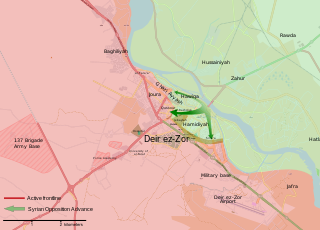
An Islamist insurgency is taking place in the Maghreb region of North Africa, followed on from the end of the Algerian Civil War in 2002. The Algerian militant group Salafist Group for Preaching and Combat (GSPC) allied itself with al-Qaeda to eventually become al-Qaeda in the Islamic Maghreb (AQIM). The Algerian and other Maghreb governments fighting the militants have worked with the United States and the United Kingdom since 2007, when Operation Enduring Freedom – Trans Sahara began.
Al-Waleed border crossing is one of three official border crossings between Iraq and Syria. It is located in the Ar-Rutba District of the Al-Anbar Governorate in western Iraq, close to the northeasternmost point of Jordan in the Syrian Desert. It serves as the main border checkpoint on the highway between Damascus and Baghdad. The al-Waleed checkpoint is close to al-Tanf on the Syrian side of the border in the Homs Governorate. The Al-Waleed Palestinian refugee camp is nearby.

The Army of the Men of the Naqshbandi Order, also called the Naqshbandi Army, is one of a number of underground Ba'athist and Sufi militant insurgency groups fighting U.S.-led Coalition forces in Iraq. Media frequently refers to the group by the initials JRTN, a romanization of its Arabic name. Supreme Command for Jihad and Liberation, technically the name of the umbrella organisation to which JRTN belongs, is also often used to refer to JRTN specifically.

Protests against the Syrian government and violence had been ongoing in the Syrian city of Deir ez-Zor since March 2011, as part of the wider Syrian Civil War, but large-scale clashes started following a military operation in late July 2011 to secure the city of Deir ez-Zor. The rebels took over most of the province by late 2013, leaving only small pockets of government control around the city of Deir ez-Zor.

The Iraqi insurgency was an insurgency that began in late 2011 after the end of the Iraq War and the withdrawal of U.S. troops from Iraq, resulting in violent conflict with the central government, as well as low-level sectarian violence among Iraq's religious groups.
The 2012–2014 Quneitra Governorate clashes began in early November 2012, when the Syrian Army began engaging with rebels in several towns and villages of the Quneitra Governorate. The clashes quickly intensified and spilled into the UN-supervised neutral demilitarized zone between Syrian controlled territory and the Israeli-occupied Golan Heights.
The Lebanese–Syrian border clashes were a series of clashes on the Lebanon–Syria border caused by the ongoing Syrian Civil War.

Operation al-Shabah was launched in May 2013 by the Iraqi Army, with the stated aim of severing contact between the Islamic State of Iraq and the Levant and the al-Nusra Front in Syria by clearing militants from the border area with Syria and Jordan.

The Islamic State of Iraq, was a Salafi jihadist militant organization that fought the forces of the U.S.-led coalition during the Iraqi insurgency. The organization aimed to overthrow the Iraqi federal government and establish an Islamic state in Iraq.

Beginning in December 2012, Sunnis in Iraq protested against the Maliki government. On 28 December 2013, a Sunni MP named Ahmed al-Alwani was arrested in a raid on his home in Ramadi. Alwani was a prominent supporter of the anti-government protests. This incident led to violence in Al Anbar Governorate between the Iraqi Army and a loose alliance of tribal militias and other groups fighting alongside the Islamic State of Iraq and the Levant (ISIL).

Following the outbreak of the protests of Syrian revolution during the Arab Spring in 2011 and the escalation of the ensuing conflict into a full-scale civil war by mid-2012, the Syrian Civil War became a theatre of proxy warfare between various regional powers such as Turkey and Iran. Spillover of the Syrian civil war into the wider region began when the Iraqi insurgent group known as the Islamic State of Iraq (ISI) started intervening in the conflict from 2012.
The following lists events that happened during 2014 in Iraq.
The following lists some remarkable events that happened in 2014 in Lebanon on a monthly basis.

The Timeline of the War in Iraq covers the War in Iraq, a war which erupted that lasted in Iraq from 2013 to 2017, during the first year of armed conflict.
2013 was the year in which the jihadist group Islamic State of Iraq and the Levant adopted that name. The group expanded its territorial control in Syria and began to do so in Iraq also, and committed acts of terrorism in both countries and in Turkey.
In early 2014, the jihadist group Islamic State of Iraq and the Levant captured extensive territory in Western Iraq in the Anbar campaign, while counter-offensives against it were mounted in Syria. Raqqa in Syria became its headquarters. The Wall Street Journal estimated that eight million people lived under its control in the two countries.
Opposition–ISIL conflict during the Syrian Civil War started after fighting erupted between Syrian opposition groups and the Islamic State of Iraq and the Levant (ISIL). In early January 2014, serious clashes between the groups erupted in the north of the country. Opposition groups near Aleppo attacked ISIL in two areas, Atarib and Anadan, which were both strongholds of the fundamentalist Sunni organization. Despite the conflict between ISIL and other rebels, one faction of ISIL has cooperated with the al-Nusra Front and the Green Battalion to combat Hezbollah in the Battle of Qalamoun. By 2018.
The origins of the Islamic State group can be traced back to three main organizations. Earliest of these was the "Jamāʻat al-Tawḥīd wa-al-Jihād" organization, founded by the Jihadist leader Abu Mus'ab al-Zarqawi in Jordan in 1999. The other two predecessor organizations emerged during the Iraqi insurgency against the U.S. occupation forces. These included the "Jaish al-Ta'ifa al-Mansurah" group founded by Abu Omar al-Baghdadi in 2004 and the "Jaysh Ahl al-Sunnah wa’l-Jama’ah" group founded by Abu Bakr al-Baghdadi and his associates in the same year.

An Islamist insurgency has been ongoing in the Sahel region of West Africa since the 2011 Arab Spring. In particular, the intensive conflict in the three countries of Mali, Niger and Burkina Faso has been referred to as the Sahel War.








